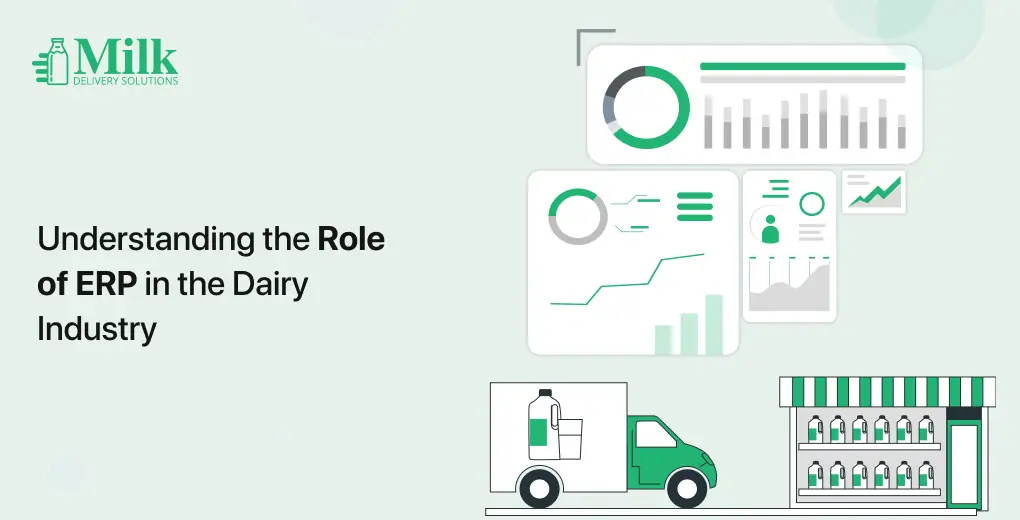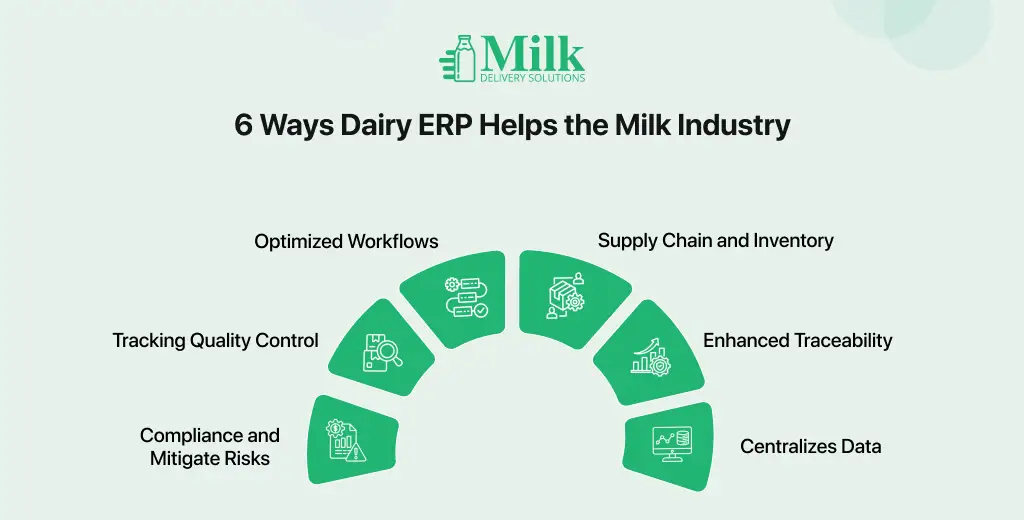Understanding the Role of ERP in the Dairy Industry

Are you a dairy business owner? Do you want to implement ERP into your business to optimize your dairy processes and improve profits?
If yes, it is essential to understand how implementing ERP software can assist your business growth.
ERP for Dairy is a crucial step towards sustainable dairy businesses. The enterprise resource planning software provides an end-to-end solution to automate and streamline dairy operations, including milk collection, production, sales, and distribution. The dairy ERP helps owners simplify operations to accurately and quickly cater to demand.
This blog will explore ways dairy ERP is helping the milk industry grow and thrive.
6 ways in which dairy ERP helps the milk industry
ERP for dairy businesses leverages artificial intelligence and machine learning to offer advanced functionalities to improve business operations and productivity. These features can help dairy businesses with unique needs, such as inventory, quality control, lot traceability, FDA compliance, warehousing, and inventory, route planning and optimization, and delivery scheduling. Ways in which dairy ERP helps the milk industry:

Optimized workflows
The dairy ERP automates repetitive tasks, reducing the need for manual interference and maintaining data integrity and accuracy. This ensures that the operations are executed accurately and enables real-time process visibility. The system allows you to define automation conditions and sequence tasks to perform a specific business operation. Automating tasks and minimizing human inputs help save time and empower employees to invest time in more strategic tasks. Benefits of optimizing workflow:
- It reduces data duplication and removes unnecessary steps from the workflow for easy and quick task completion.
- Real-time process visibility helps to identify operational bottlenecks and solve them.
Supply chain and inventory
The enterprise resource planning system provides a comprehensive platform that ensures consistent and accurate data, minimizing the chances of overstocking and stockouts. An ERP solution automates stock management, providing real-time tracking, demand forecasting, and optimizing stock levels.
The ERP uses predictive analytics to analyze historical data and trends to anticipate future demands. It enables you to monitor operations in real time, make informed decisions, and prevent disruptions. Ways ERP helps you streamline supply chain and inventory management:
- The system stores the entire supply chain data in one place, providing complete and real-time visibility into inventory, orders, production, quality control, and deliveries.
- Automation streamlines processes for faster order fulfillment, reduced lead times, and improved customer satisfaction.
- ERP offers advanced AI and ML to analyze data and trends to forecast future demand.
Tracking quality control
The system enables dairy businesses to manage and track laboratory findings in real time, consistently maintaining milk and dairy product quality. An ERP system provides real-time data visibility, automates operation, and empowers you to standardize parameters, improving efficiency and productivity, and reducing the chances of low-quality milk production. The system manages all the necessary documents for auditing, making it easy for the auditor to inspect the processes. This makes complying with industrial regulations easy. Ways in which ERP helps you improve product quality:
- The system provides real-time data and insights, enabling businesses to monitor product quality at every step.
- ERP provides a specific module to manage and track quality data, identify problems, and implement corrective actions.
- This system helps businesses comply with relevant industrial standards, improving product quality.
Enhanced traceability
Traceability is the ability of a business to track and document the journey of a product from its origin to its user. It includes information about the product, such as where it came from, who handled it, what processes it went through, and where it is currently located. Milk Delivery Solutions offers traceability, which is essential to maintain product quality, manage risks, and comply with regulations. Ways ERP improves traceability:
- ERP centralizes data and automates seamless data flow, provides real-time tracking, and enhances transparency.
- It automates and streamlines business processes to improve efficiency and reduce errors.
- Better data visibility enables businesses to make better decisions.
Compliance and mitigate risks
Enterprise resource planning software provides secure access, audit-ready processes, automated workflows, and proactive risks, using data analytics and continuous monitoring. The system offers access controls to protect data and prevent unauthorized access. Ways in which an enterprise resource planning system helps you comply with industry regulations and mitigate risks:
- It stores and maintains all the documents required during audits, ensuring audit readiness.
- ERP enables you to implement robust audit management practices to track and maintain compliance documents.
- The system prepares you with clear documentation, processes, and data readily available for audits.
Centralizes data
The system provides a unified approach to the business, storing all your data in one place and offering a single source of truth. It collects data from various departments, such as finance, manufacturing, and supply chain, and stores it in a single place. Centralized data eliminate data silos due to multiple software. A unified data approach improves accuracy and consistency, reducing errors and improving decision-making. Ways centralized data help your business:
- Centralizing data provides real-time updates on business operations.
- It improves and maintains data integrity and consistency, improving data analytics and decision-making.
- Storing all the business data in a single place streamlines processes and provides a unified view of operations.
Conclusion
An enterprise resource planning (ERP) system is a comprehensive solution for all your business needs. It automates and streamlines operations to improve efficiency, productivity, and profitability while reducing costs. Implementing ERP in your dairy businesses empowers you to track and manage operations from a single screen. Book a free demo and see how “Milk Delivery Solutions” can help.


